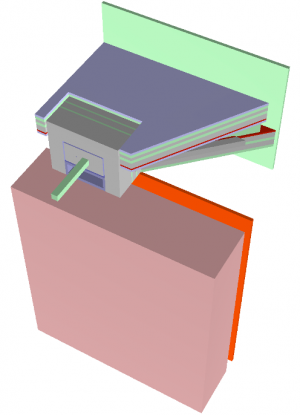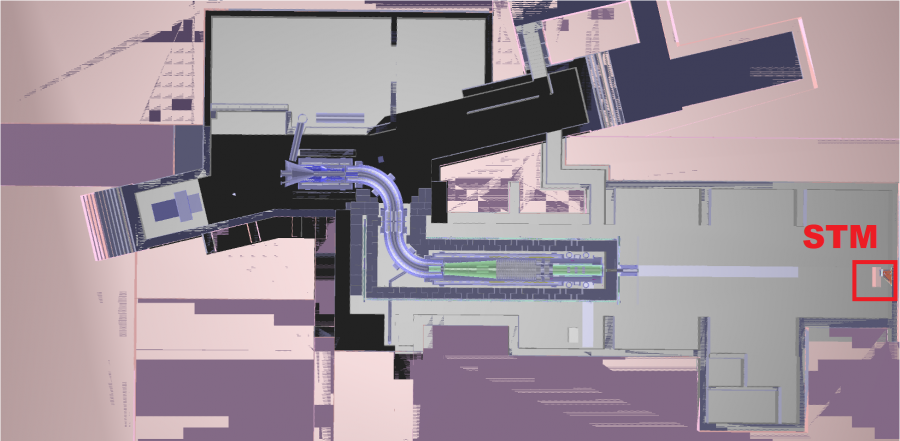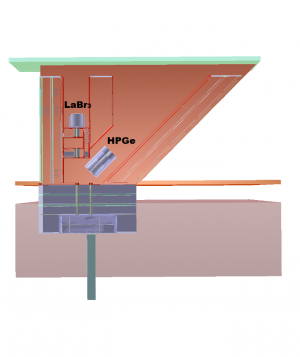User:Hcao: Difference between revisions
No edit summary |
No edit summary |
||
| Line 1: | Line 1: | ||
== STM == | == STM == | ||
* Introduction of STM | * Introduction of STM(Stopping Target Monitor) | ||
The mu2e experiment measures <math>\mu^-Al\rightarrow e^-Al</math> process with a single event sensitivity, <math>R_{\mu e} = \frac{Neutrinoless\ \mu\ to\ e\ conversion\ (CLVF)}{All\ \mu\ captured\ by Al neuclei at\ the\ stopping\ target }</math> or <math>R_{\mu e} = \frac{\varGamma (\mu^- + A(Z,N) \rightarrow e^- + A(Z,N)) }{\varGamma(\mu^- + A(Z,N) \rightarrow \nu _\mu + A(Z-1,N) ) }</math>. The goal of the STM is getting the number of stopped muons with 10% precision, so that the systematic error in the captured muon number is small enough compared with the statistical error in the number muon-converted-electron. | |||
Three transitions are utilized. | |||
1) 347 keV, 2p-1s X-ray, 79.8% of muon stops. X-rays emitted when the muon comes to rest in the Stopping Target and is captured into atomic orbit (atomic capture). They are prompt signals with O(ps). | 1) 347 keV, 2p-1s X-ray, 79.8% of muon stops. X-rays emitted when the muon comes to rest in the Stopping Target and is captured into atomic orbit (atomic capture). They are prompt signals with O(ps). | ||
Revision as of 20:28, 19 June 2024
STM
- Introduction of STM(Stopping Target Monitor)
The mu2e experiment measures [math]\displaystyle{ \mu^-Al\rightarrow e^-Al }[/math] process with a single event sensitivity, [math]\displaystyle{ R_{\mu e} = \frac{Neutrinoless\ \mu\ to\ e\ conversion\ (CLVF)}{All\ \mu\ captured\ by Al neuclei at\ the\ stopping\ target } }[/math] or [math]\displaystyle{ R_{\mu e} = \frac{\varGamma (\mu^- + A(Z,N) \rightarrow e^- + A(Z,N)) }{\varGamma(\mu^- + A(Z,N) \rightarrow \nu _\mu + A(Z-1,N) ) } }[/math]. The goal of the STM is getting the number of stopped muons with 10% precision, so that the systematic error in the captured muon number is small enough compared with the statistical error in the number muon-converted-electron.
Three transitions are utilized.
1) 347 keV, 2p-1s X-ray, 79.8% of muon stops. X-rays emitted when the muon comes to rest in the Stopping Target and is captured into atomic orbit (atomic capture). They are prompt signals with O(ps).
2)1809 keV gamma-ray, 51% of muon nuclear capture after muon stops. 61% of stopped muons are captured by the nuclei. These exhibit timing characteristics of the muonic lifetime ([math]\displaystyle{ \tau = 864 ns }[/math]).
3)844 keV gamma-ray 9.3% of muon nuclear capture after muon stops. The process leading to its emission is [math]\displaystyle{ \mu^- + ^{27}Al\rightarrow \nu _\mu + ^{27}Mg }[/math]. [math]\displaystyle{ ^{27}Mg }[/math] has a lifetime of 13.6 minutes. This line is appealing because of its time characteristics because it can be measured in the low background time during 1 second beam-off period in the 1.4 second main injector/recycler ring cycle.
- Position of STM
Because the strong radiation flash (consisting of muons, electrons, neutrons, X-rays and gamma-rays) overwhelms the electronic rate capability and causes radiation damages to detectors, the STM detectors need to be protected in several ways. (1) STM is placed ~35 m away from the stopping target, not in the Detector Solenoid. (2)A shielding house with small collimator apertures is built. (3)Polyethylene absorbers are placed inside of the Detector Solenoid and in front of the HPGe detector.
- STM Detectors
Two detectors are used to measure the X rays and gamma rays generated by the stopped muons. One of them, the LaBr3 detector, is capable of high rate operation up to and above 800 kcps with energy resolution 0.7%. The other, the HPGe detector is capable of energy resolution of 0.1%, however its rate capability is limited to ∼70 kcps.
Details of the detector geometries and materials can be found in docdb-49130. Details of the detector resolution can be found in docdb-36803.



